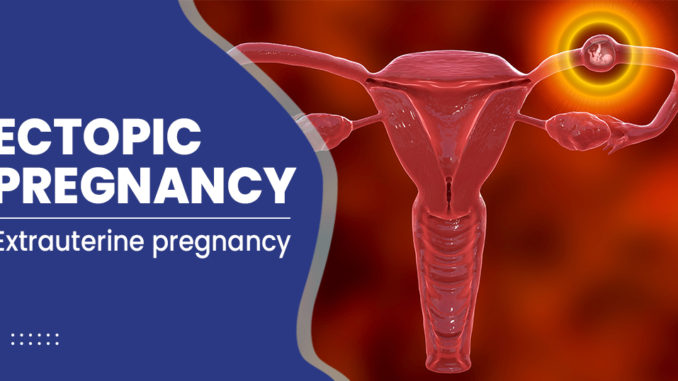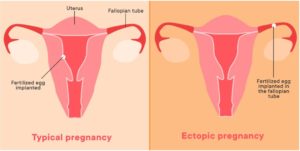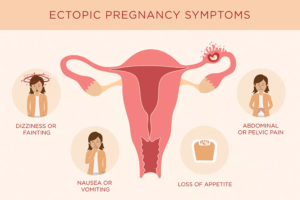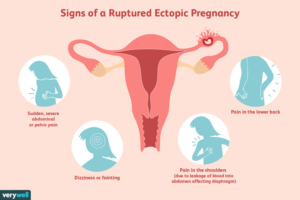
Table of Contents
What is Ectopic pregnancy?
- Ectopic pregnancy is a condition in which the fertilized eggs implant in other areas than the uterus.
- A ectopic pregnancy is a condition where the fertilized eggs implants outside the uterine lining; such as fallopian tube, abdominal cavity or cervix
- Normally, a fertilized egg is supposed to implant or get attached to the uterine lining/uterus. When it does not, it is known as ectopic pregnancy.
- Ectopic pregnancy is a complication of pregnancy where embryo attaches outside the uterus.
- It is a life threatening condition that requires immediate medical care and treatment.
- In 90% of cases, ectopic pregnancy occurs in fallopian tube, which is known as tubal pregnancy

Key Facts
- It is quite unlikely that an ectopic pregnancy may be saved.
- There is not enough area for any ectopic pregnancy in the fallopian tubes to develop which will eventually result in rupturing of the tube.
- Ectopic pregnancy cannot be carried to term (till birth) and is a life threatening condition to mother if not treated right away
- Any ectopic pregnancy poses a significant threat to life. This is due to the possibility that as the pregnancy progresses, the implanted structure may burst or rupture. A rupture is a serious emergency that calls for immediate treatment since it can cause severe internal bleeding.
- In United Kingdom (UK), 1 in every 90 pregnancies is ectopic, which means 11,000 ectopic pregnancies in a year.
- Studies suggest that, 1 in every 50 pregnancies in the United States (US) are ectopic.
Causes
- Most of the time, the cause of a woman’s ectopic pregnancy is unclear.
- It occasionally occurs when there is a problem with the fallopian tubes, such as when they are blocked or narrow.
- In some cases, following conditions are linked to ectopic pregnancy:
- Inflammation or scarring of the fallopian tube
- Hormonal factors
- Genetic abnormalities
- Birth defects
- Medical condition that alter the shape and condition of the fallopian tubes and reproductive organs
- Moreover, there are certain risk factors associated to cause ectopic pregnancy
Risk Factors of Ectopic Pregnancy
- Previous ectopic pregnancy
- Inflammation or infection: Sexually transmitted infections, such as gonorrhea or chlamydia, can cause inflammation in the tubes and other nearby organs, and increase risk of an ectopic pregnancy.
- Fertility treatments: According to some studies, women who undergo in vitro fertilization (IVF) or other similar procedures may be more prone to experience an ectopic pregnancy. Infertility can also increase your risk.
- Tubal surgery: The risk of an ectopic pregnancy is increased by surgery done to repair a closed or damaged fallopian tube.
- Choice of birth control: It’s extremely unlikely to become pregnant when using an intrauterine device (IUD). But if it happens so while wearing an IUD, it is more likely to be ectopic. Also if pregnancy occurs after having tubes tied, or tubal ligation, a permanent birth control method, risk of having ectopic pregnancy also increase.
- Smoking: The risk of an ectopic pregnancy can increase if pregnant women smoke right before getting pregnant. With more smoking, the risk of ectopic pregnancy rises.
Risk Groups
Every woman who is sexually active faces some risk of an ectopic pregnancy. Risk factors increase with any of the following:
- 35 years or older mothers
- History of multiple abortions, abdominal surgery, or pelvic surgery
- History of pelvic inflammatory disease (PID)
- History of endometriosis
- Pregnancy facilitated by fertility treatments such as in-vitro fertilization or medications
- Pregnancy in spite of tubal ligation or an intrauterine device (IUD)
- Tried to have tubal ligation (tubes tied) or tubal legation reversal
- Fertility drugs
- Smoking
- Having a history of sexually transmitted diseases (STDs), such as gonorrhea or chlamydia
- Having structural abnormalities with the fallopian tubes that make it difficult for the egg to migrate
- Past ectopic pregnancy
When Can Ectopic Pregnancy be Detected?
- Ectopic Pregnancy is generally identified within the first trimester (first three months) of pregnancy.
- It is lately discovered by eighth week of pregnancy.
Signs and Symptoms of Ectopic Pregnancy

The early symptoms are similar to typical pregnancy. Early signs and symptoms can include:
- Light vaginal bleeding and pelvic pain
- Stomach upset and vomiting
- Sharp abdominal cramps
- Tummy pain low down on one side of your body
- Dizziness or weakness
- Pain in your shoulder, neck, or rectum
- Discomfort when urinating or having stool
- If there is rupture in the organs, it may result in severe bleeding and pain
Complications During ectopic pregnancy
- Fallopian tube may become completely ruptured due to an ectopic pregnancy.
- The ruptured tube may cause fatal hemorrhage if left untreated.
When to Receive Emergency Care?
A person must receive emergency care at the hospital if she experiences the combination of following symptoms:
- Very sick
- Very dizzy or fainting or low blood pressure
- Sharp, sudden and intense pain in the tummy
- Looking very pale
These symptoms resemble that the fallopian tube has ruptured and requires immediate surgery and medical attention.

Can a Female Get Pregnant Again After Ectopic Pregnancy?
- Yes, females can get pregnant again after ectopic pregnancy only through proper recovery from the ectopic pregnancy
- Although females can get pregnant quickly after treatment, it is advised to wait for three menstrual cycles after treatment so that the fallopian tube gets enough time to heal.
- For the following pregnancy, a routine examination and consultation with a medical expert is required.
Diagnosis
The tests that are often used to diagnose an early ectopic pregnancy include:
- Measurement of Human Chorionic Gonadotropin (hCG) and/or progesterone levels in the bloodstream
- Ultrasound
- Laparoscopy
- Dilation and curettage (D&C)
- Urine test
Prevention
Although there is no way of preventing an ectopic pregnancy, there are certain actions that can lessen the risk:
- Using a condom during sex and limiting the number of sexual partners helps to prevent STDs and may lower the risk of pelvic inflammatory disease.
- Adoption of a healthy lifestyle that includes regular physical activity and avoiding smoking habits
- Maintaining good reproductive health
Treatment
There are 3 main treatments suggested for an ectopic pregnancy:
- Expectant management– careful monitoring and 1 of the treatments below is used if the fertilized egg doesn’t dissolve by itself
- Medicine–a strong medication called methotrexate is usually injectedto prevent the pregnancy from progressing
- Surgery– keyhole surgery (laparoscopy) to remove the fertilized egg, along with the affected fallopian tube
References and For More Information
https://www.acog.org/advocacy/facts-are-important/understanding-ectopic-pregnancy
https://www.nhs.uk/conditions/ectopic-pregnancy/symptoms/
https://www.nhs.uk/conditions/ectopic-pregnancy/
https://www.webmd.com/baby/pregnancy-ectopic-pregnancy#1
https://www.ncbi.nlm.nih.gov/books/NBK539860/
https://www.healthline.com/health/pregnancy/ectopic-pregnancy#prevention
https://my.clevelandclinic.org/health/diseases/9687-ectopic-pregnancy
https://www.acog.org/womens-health/faqs/ectopic-pregnancy